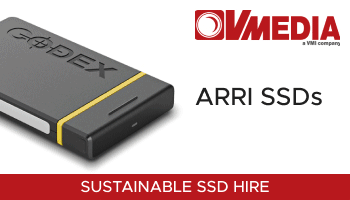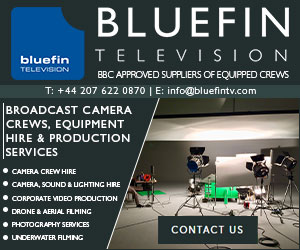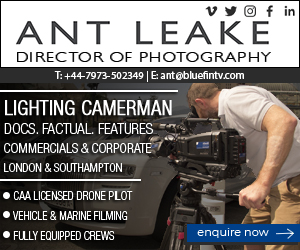Broadcast News
31/10/2012
Jigsaw 24 -Working With The Blackmagic Design Cinema Camera: The Workflow
By Liz Sunter
Cinema Camera test pilots Den Lennie of F-Stop Academy and Hangman Studios' James Tonkin agreed to share their thoughts on Blackmagic Design's camera. In this part, they tackle the Resolve workflow, editing setups and power distribution...
Working with Resolve
James: As mentioned, because I regularly grade mine and other people's footage, I always think in terms of the grade when I'm filming. I love Resolve and the power it brings to the grade, and without doubt it's an essential part of the workflow with the Cinema Camera. The reason why Resolve and the Cinema Camera are companion products is because a RAW DNG workflow requires the source media to be processed into a editorial format, such as ProRes, so that it can be edited within any of the common NLEs. Hence as soon as you've shot RAW with the camera, opening Resolve is the next stage, unless you choose an alternative workflow.
Den: Working with Resolve is just stunning, but it takes a learning curve. It's not just a straight in, plug and play, drop-over-a-look program, it's much more powerful than that. Blackmagic Design have actually given people a quarter of a million pound piece of software that's used for grading feature films for free, but I think there's a danger that users will think that because it's free it's going to be easy. However, there's a real education required when you move towards that Resolve workflow. If you're going to go down the DNG route, you have to think about doing your dailies, creating that file, exporting that file in the ProRes proxy or whatever into FCP X, cut that, create your grade and then roundtrip it into the DNG format. It is complex, but it's quite straightforward once you know how. So I think there's going to be an education required for working with this camera in RAW. But of course, you can just shoot ProRes, and now DNX, and I think that is one of the single most powerful selling points of this camera. The sensor is incredible, so far it's just blown us away, great dynamic range, but you can acquire your footage in your edit format and that, I think, is transformational.
Changing your editing setup
Den: [The Cinema Camera workflow] made me sell my 17" MacBook Pro and buy a 15" Retina Display one. I took the decision early on to get the infrastructure to support this. I bought FCP X about 18 months ago and didn't really start using it 'til early this year, but I've embraced it fully, don't even have a copy of FCP 7 anymore, and so I've realised to go down the Thunderbolt route - I've got a Thunderbolt MacBook Pro and an iMac, with the full Resolve setup on both machines - it's very, very important that you have to get the right hardware.
Beach RAW 709 LUTYou also need to think about getting some kind of grading monitor. It's pointless shooting RAW and grading it on your computer screen, you need a 10-bit monitor. This is a cinema camera and you need to invest in having some cinema tools. I've probably spent five to ten grand on monitors and accessories, but it's still a lot better than buying a RED Scarlet, for example, and I think that's where I see it, I see this as a Scarlet replacement, giving me the images I want with a good balance between bit depth, dynamic range and the size of the image.
Shooting in 4:2:2
James: Having ProRes/DNxHD as the 'lower' recording format in the BMCC shows the camera's positioning as a professional tool. Image quality has clearly been the leading factor behind the design of the camera and as an online editor and colourist for over ten years, I completely applaud seeing more cameras which offer this type of quality right the way through to post-production. I completely understand the need for compressed formats on other cameras, but after several years of working with H.264 footage from DSLRs I'd had enough and moved onto AVCHD formats, and now to this
Den: Let's take DSLRs as an example. If you try and grade DSLR footage, which is 4:2:0, as soon as you pull a key and try and modify a colour of a particular item it just falls apart. You get noise and it just doesn't work, so you can't grade that footage very far, which really limits what you can do with the footage once you get it back.
The FS100 and FS700 actually grade very well, given that they're only an 8-bit 4:2:0 AVCHD codec - something about the AVCHD codec means it holds up much better during colour grading. Then you go to the Cinema Camera and you suddenly take a leap of about ten places, because you've got a RAW codec that's 12-bit and that's so much more data, so you can pull keys off all sorts of images, push really extreme grades, and the image holds together. Because there's so much data there, you don't get any noise, you don't get the image break up that you'd see with DSLRs.
James: I have a keen eye for detail, especially when it comes to the finishing stage of a project, and as such I really see the benefits in higher bitrate codecs and colour space on a lot of the work we do. Filming live music and concerts in particular puts a huge demand on the cameras used, and the higher the bitrates the more chance of avoiding any macro blocking or image artefacts from strobe lighting and the different intensities of dynamic range which occur with concert lighting.
BMCC handheld with Zeiss CP2Den: But it's worth bearing in mind that the majority of Alexa users, even in Hollywood, are shooting in ProRes, so we mustn't discount how good a codec ProRes is, and has been for some time. A friend of mine is shooting the new season of Dallas, Rodney Charters, and he shoots in ProRes because of the speed. I think the only person not shooting ProRes is Roger Deakins, who just shot Skyfall, and he's using Codex recorders. And even he shot 2K, and they just up-resed to 4k for the IMAX and he said it was perfectly okay. So what we're doing is we're getting access to the same codecs they're using in Hollywood for an absolute smidgen of the price. So I think as filmmakers, if we can't all afford the Alexas, we don't need the Alexas. We can shoot with this camera and get something very, very comparable and work in a similar way to the Alexa workflow.
www.jigsawbroadcast.com
Cinema Camera test pilots Den Lennie of F-Stop Academy and Hangman Studios' James Tonkin agreed to share their thoughts on Blackmagic Design's camera. In this part, they tackle the Resolve workflow, editing setups and power distribution...
Working with Resolve
James: As mentioned, because I regularly grade mine and other people's footage, I always think in terms of the grade when I'm filming. I love Resolve and the power it brings to the grade, and without doubt it's an essential part of the workflow with the Cinema Camera. The reason why Resolve and the Cinema Camera are companion products is because a RAW DNG workflow requires the source media to be processed into a editorial format, such as ProRes, so that it can be edited within any of the common NLEs. Hence as soon as you've shot RAW with the camera, opening Resolve is the next stage, unless you choose an alternative workflow.
Den: Working with Resolve is just stunning, but it takes a learning curve. It's not just a straight in, plug and play, drop-over-a-look program, it's much more powerful than that. Blackmagic Design have actually given people a quarter of a million pound piece of software that's used for grading feature films for free, but I think there's a danger that users will think that because it's free it's going to be easy. However, there's a real education required when you move towards that Resolve workflow. If you're going to go down the DNG route, you have to think about doing your dailies, creating that file, exporting that file in the ProRes proxy or whatever into FCP X, cut that, create your grade and then roundtrip it into the DNG format. It is complex, but it's quite straightforward once you know how. So I think there's going to be an education required for working with this camera in RAW. But of course, you can just shoot ProRes, and now DNX, and I think that is one of the single most powerful selling points of this camera. The sensor is incredible, so far it's just blown us away, great dynamic range, but you can acquire your footage in your edit format and that, I think, is transformational.
Changing your editing setup
Den: [The Cinema Camera workflow] made me sell my 17" MacBook Pro and buy a 15" Retina Display one. I took the decision early on to get the infrastructure to support this. I bought FCP X about 18 months ago and didn't really start using it 'til early this year, but I've embraced it fully, don't even have a copy of FCP 7 anymore, and so I've realised to go down the Thunderbolt route - I've got a Thunderbolt MacBook Pro and an iMac, with the full Resolve setup on both machines - it's very, very important that you have to get the right hardware.
Beach RAW 709 LUTYou also need to think about getting some kind of grading monitor. It's pointless shooting RAW and grading it on your computer screen, you need a 10-bit monitor. This is a cinema camera and you need to invest in having some cinema tools. I've probably spent five to ten grand on monitors and accessories, but it's still a lot better than buying a RED Scarlet, for example, and I think that's where I see it, I see this as a Scarlet replacement, giving me the images I want with a good balance between bit depth, dynamic range and the size of the image.
Shooting in 4:2:2
James: Having ProRes/DNxHD as the 'lower' recording format in the BMCC shows the camera's positioning as a professional tool. Image quality has clearly been the leading factor behind the design of the camera and as an online editor and colourist for over ten years, I completely applaud seeing more cameras which offer this type of quality right the way through to post-production. I completely understand the need for compressed formats on other cameras, but after several years of working with H.264 footage from DSLRs I'd had enough and moved onto AVCHD formats, and now to this
Den: Let's take DSLRs as an example. If you try and grade DSLR footage, which is 4:2:0, as soon as you pull a key and try and modify a colour of a particular item it just falls apart. You get noise and it just doesn't work, so you can't grade that footage very far, which really limits what you can do with the footage once you get it back.
The FS100 and FS700 actually grade very well, given that they're only an 8-bit 4:2:0 AVCHD codec - something about the AVCHD codec means it holds up much better during colour grading. Then you go to the Cinema Camera and you suddenly take a leap of about ten places, because you've got a RAW codec that's 12-bit and that's so much more data, so you can pull keys off all sorts of images, push really extreme grades, and the image holds together. Because there's so much data there, you don't get any noise, you don't get the image break up that you'd see with DSLRs.
James: I have a keen eye for detail, especially when it comes to the finishing stage of a project, and as such I really see the benefits in higher bitrate codecs and colour space on a lot of the work we do. Filming live music and concerts in particular puts a huge demand on the cameras used, and the higher the bitrates the more chance of avoiding any macro blocking or image artefacts from strobe lighting and the different intensities of dynamic range which occur with concert lighting.
BMCC handheld with Zeiss CP2Den: But it's worth bearing in mind that the majority of Alexa users, even in Hollywood, are shooting in ProRes, so we mustn't discount how good a codec ProRes is, and has been for some time. A friend of mine is shooting the new season of Dallas, Rodney Charters, and he shoots in ProRes because of the speed. I think the only person not shooting ProRes is Roger Deakins, who just shot Skyfall, and he's using Codex recorders. And even he shot 2K, and they just up-resed to 4k for the IMAX and he said it was perfectly okay. So what we're doing is we're getting access to the same codecs they're using in Hollywood for an absolute smidgen of the price. So I think as filmmakers, if we can't all afford the Alexas, we don't need the Alexas. We can shoot with this camera and get something very, very comparable and work in a similar way to the Alexa workflow.
www.jigsawbroadcast.com
Top Related Stories
Click here for the latest broadcast news stories.
30/10/2012
Jigsaw24 - Working With The Blackmagic Design Cinema Camera: The Camera
Jigsaw24 - Working With The Blackmagic Design Cinema Camera: The Camera - Part 1 By Liz Sunter While we've not been shy about getting grabby with the
Jigsaw24 - Working With The Blackmagic Design Cinema Camera: The Camera
Jigsaw24 - Working With The Blackmagic Design Cinema Camera: The Camera - Part 1 By Liz Sunter While we've not been shy about getting grabby with the
13/03/2012
Vitec GTC Awards 2012 Nominees Announced
The Guild of Television Cameramen (GTC) has announced the shortlist for the Vitec GTC Awards 2012. The awards will be presented at the IET Austin Cour
Vitec GTC Awards 2012 Nominees Announced
The Guild of Television Cameramen (GTC) has announced the shortlist for the Vitec GTC Awards 2012. The awards will be presented at the IET Austin Cour
30/10/2012
Jigsaw24 - Working With The Blackmagic Design Cinema Camera: The Camera - Part 2
Jigsaw24 - Working With The Blackmagic Design Cinema Camera: The Camera - Part 2 By Liz Sunter The Micro 4/3" Cinema Camera At IBC, Blackmagic Design
Jigsaw24 - Working With The Blackmagic Design Cinema Camera: The Camera - Part 2
Jigsaw24 - Working With The Blackmagic Design Cinema Camera: The Camera - Part 2 By Liz Sunter The Micro 4/3" Cinema Camera At IBC, Blackmagic Design
02/04/2014
Bradley Engineering To Showcase Developments At NAB
British manufacturer Bradley Engineering will be showing a set of newly-developed camera heads and accessories for unobtrusive and remote controlled f
Bradley Engineering To Showcase Developments At NAB
British manufacturer Bradley Engineering will be showing a set of newly-developed camera heads and accessories for unobtrusive and remote controlled f
10/05/2013
Gearhouse Broadcast & Hitachi Hit The Road
"Ever since we announced our partnership with Hitachi interest in these superb HDTV cameras has been exceptionally high. Now, through our national roa
Gearhouse Broadcast & Hitachi Hit The Road
"Ever since we announced our partnership with Hitachi interest in these superb HDTV cameras has been exceptionally high. Now, through our national roa
01/08/2014
ATEM Switchers Update 6.0 Now Available To Download
Blackmagic Design has announced the immediate availability of ATEM Switchers Update 6.0. ATEM Switchers Update 6.0 adds support for controlling camera
ATEM Switchers Update 6.0 Now Available To Download
Blackmagic Design has announced the immediate availability of ATEM Switchers Update 6.0. ATEM Switchers Update 6.0 adds support for controlling camera
27/10/2008
Vaddio Adds Panasonic Robotic Cameras In Strategic OEM Distribution Agreement
Vaddio, a leading designer and OEM distributor of speciality PTZ cameras and high-end camera control system used in the broadcasting, audio/visual and
Vaddio Adds Panasonic Robotic Cameras In Strategic OEM Distribution Agreement
Vaddio, a leading designer and OEM distributor of speciality PTZ cameras and high-end camera control system used in the broadcasting, audio/visual and
02/07/2014
Derek Yee Selects Blackmagic 4K Cam
Award winning director Derek Yee has purchased the Blackmagic Production Camera 4K for his production team and to provide footage for his new film 'I
Derek Yee Selects Blackmagic 4K Cam
Award winning director Derek Yee has purchased the Blackmagic Production Camera 4K for his production team and to provide footage for his new film 'I
03/09/2012
Hitachi Showcases SK-HD1500 High-Speed Broadcast System Camera
Hitachi is set to introduces the New SK-HD1500 High-Speed Broadcast System Camera in Europe. On its stand at IBC (11.E30), Hitachi Kokusai Electric Eu
Hitachi Showcases SK-HD1500 High-Speed Broadcast System Camera
Hitachi is set to introduces the New SK-HD1500 High-Speed Broadcast System Camera in Europe. On its stand at IBC (11.E30), Hitachi Kokusai Electric Eu
19/04/2018
Ikegami To Show New Camera Additions At The Media Production Show
Ikegami Electronics (Europe) is to showcase two new additions to its camera range at the the Media Production Show in London, June 12-13. The Ikegami
Ikegami To Show New Camera Additions At The Media Production Show
Ikegami Electronics (Europe) is to showcase two new additions to its camera range at the the Media Production Show in London, June 12-13. The Ikegami
14/12/2017
GBCT Camera Schools RED Camera Workshop
The Guild of British Camera Technicians is running a series of one-day, practical camera courses for small groups around the country. Run in partnersh
GBCT Camera Schools RED Camera Workshop
The Guild of British Camera Technicians is running a series of one-day, practical camera courses for small groups around the country. Run in partnersh
08/05/2015
Miller Camera Supports Young Camera Operator
When 18-year-old high school student Nate Ilardi was looking to kick start his career and gain more traction as an up-and-coming camera operator, he r
Miller Camera Supports Young Camera Operator
When 18-year-old high school student Nate Ilardi was looking to kick start his career and gain more traction as an up-and-coming camera operator, he r
19/02/2015
How Camera Technology Is Transforming Programme Coverage
During the last decade camera technology has dramatically changed the way footage is captured. Every time audiences turn on their TV screens, open the
How Camera Technology Is Transforming Programme Coverage
During the last decade camera technology has dramatically changed the way footage is captured. Every time audiences turn on their TV screens, open the
15/02/2013
Camera Corps Demo Advances In Remote Camera Control
Camera Corps (a Vitec Group company) will demonstrate a major advance in remote camera control technology on its 2013 NAB Show booth, C6032. The new R
Camera Corps Demo Advances In Remote Camera Control
Camera Corps (a Vitec Group company) will demonstrate a major advance in remote camera control technology on its 2013 NAB Show booth, C6032. The new R
13/02/2013
Camera Corps Bring SIMPLY SMPTE Camera To 2013 NAB Show
Camera Corps has chosen the 2013 NAB Show in Las Vegas for the introduction of its SIMPLY SMPTE compact remote camera link to American broadcasters an
Camera Corps Bring SIMPLY SMPTE Camera To 2013 NAB Show
Camera Corps has chosen the 2013 NAB Show in Las Vegas for the introduction of its SIMPLY SMPTE compact remote camera link to American broadcasters an















